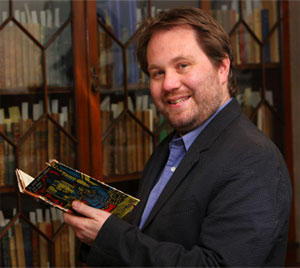 |
| Dean Irvine heads the project called Editing Modernism in Canada. (Nick Pearce Photo) |
Writing in 1941, Hugh MacLennan asserted “there is, as yet, no tradition of Canadian literature.”
It’s a sentiment shared by many who believe that Canadian literature started to flourish with the Margarets—Atwood and Laurence—in the 1960s and '70s. Canlit continues to blossom and grow on bestseller lists and English class syllabi, nurtured by names like Munro and MacLeod, Ondaatje and Vasanji, Mistry and Martel.
But Dean Irvine takes exception—Canadian writers had “an international presence at a much earlier historical moment than is represented in the popular imagination.”
“Looking at these authors (from the 1920s, '30s and '40s), we really see how innovative and politically radical they were,” continues Dr. Irvine, associate professor in the Department of English at Dalhousie, giving such examples as Morley Callaghan, Elizabeth Smart, Dorothy Livesay, Bertram Booker, and that Canlit doubter Hugh MacLennan, best known for the groundbreaking Barometer Rising, set against the historic backdrop of the 1917 Halifax Explosion.
“Canadian literature acquired a kind of avant-garde character long before the generation of the Margarets. There’s this assumption that Canadian literature magically emerged as a phenomenon in the 1960s.”
Dr. Irvine is marshalling forces to change perceptions about Canlit. He’s leading a major, multi-million-dollar research project comprising 32 researchers from universities across Canada, in the United States, the U.K. and France to re-invigorate interest in Canlit’s earlier generation.
Called Editing Modernism in Canada, the project takes a multi-pronged approach. It involves publishing titles that were never published or are long out of print, both in traditional bookform and on the web. The works of art—poetry, fiction, nonfiction drama and autobiography—would be accompanied by supplemental texts, such as introductions, biographies, correspondence, questions to lead book-club discussions and alternate versions, not unlike the special features on a DVD.
But publishing is just one side of the project. Other elements include creating a website as a meeting place for the academics involved; organizing editing workshops for print and digital editions (the first one to be held at Dalhousie next summer); and holding conferences to bring all the partners together—at the University of Toronto in 2010 and at the Sorbonne in Paris in 2012.
The first book, a long-lost novel from the 1930s, has already been edited by Colin Hill, a professor at the University of Toronto, and published by the University of Ottawa Press as part of the Canadian Literature Collection. Waste Heritage was written by Irene Baird, a journalist who disguised herself as a nurse to gain access to the violent labour disputes which inspire her novel.
Dr. Irvine, who is teaching an English class called Modernisms and Masculinities this summer, will be able to talk about Waste Heritage now that it’s available again for the first time in decades.
“This is exciting—to introduce a novel written in 1939 to my students,” says Dr. Irvine. “And I can do that now that it’s available in print again.”
Originally published in 1939, the novel “was quietly censored because of its leftist, agitational character,” says Dr. Irvine. Set among B.C.’s homeless and unemployed during the 1938 sit-down protests, Waste Heritage speaks about the east-end of Vancouver today with as much relevance as it did then. In a review in The Globe and Mail last month, Waste Heritage was called “remarkable in its prescience and unsparing in its portrait of Canadians’ attitudes at the time.”
Some of the other titles soon to make their debuts (again) include Dry Water by Robert Stead (edited by Neil Querengesser and Jean Horton), The Wrong World: Selected Stories, Essays and Manifestoes by Bertram Brooker (edited by Gregory Betts) and This Time a Better Earth by Ted Allan (edited by Dalhousie graduate student Bart Vautour). Two early books by Hugh MacLennan, A Man Should Rejoice and So All Their Praises, will be published for the first time.
In re-introducing the books, Dr. Irvine says they’ve learned from the book-club crowd, who want attractively designed, easy-to-read books.
“We really want Canadians to pick up these books and to read them—this is Canadian literature for Canadians—not just 19-year-old students who have to read them for class.”
LINK: Irene Baird's Waste Heritage, Canadian Literature Collection | Ten questions with Colin Hill about Waste Heritage
